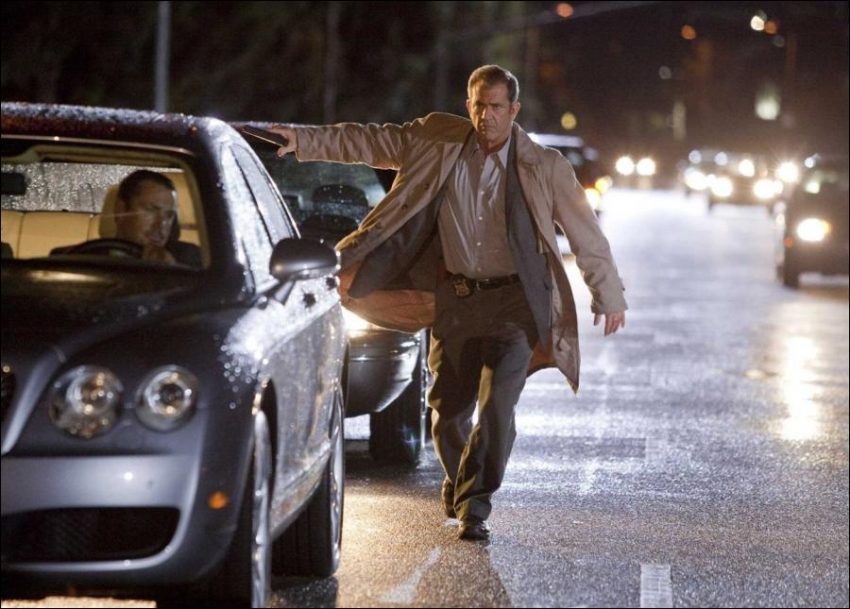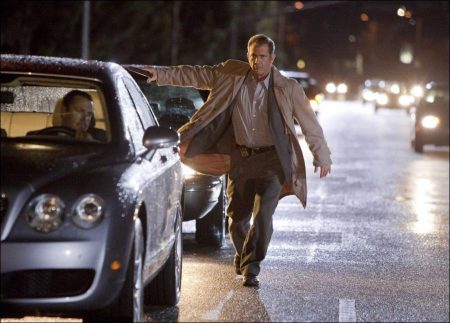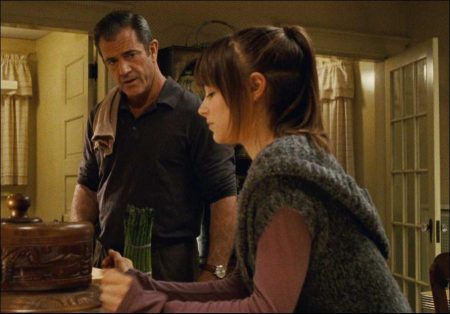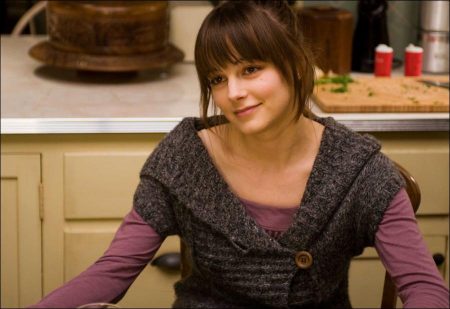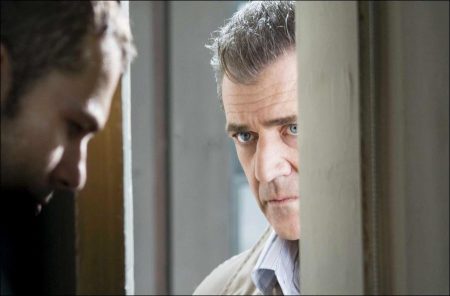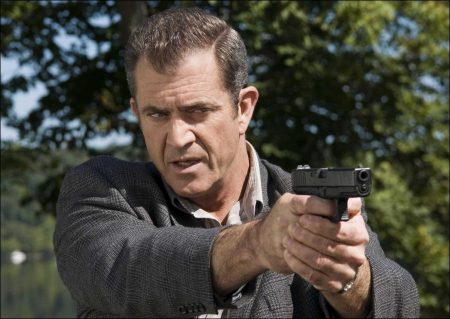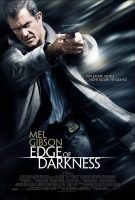Taglines: Few escape justice. None escape vengeance.
Thomas Craven (Mel Gibson) is a veteran homicide detective for the Boston Police Department and a single father. When his only child, twenty-four year old Emma (Bojana Novakovic), is murdered on the steps of his home, everyone assumes that he was the target. But he soon suspects otherwise, and embarks on a mission to find out about his daughter’s secret life and her killing.
His investigation leads him into a dangerous looking-glass world of corporate cover-ups, government collusion and murder – and to shadowy government operative Darius Jedburgh (Ray Winstone), who has been sent in to clean up the evidence. Craven’s solitary search for answers about his daughter’s death transforms into an odyssey of emotional discovery and redemption.
Edge of Darkness is a 2010 crime film directed by Martin Campbell and also produced by Michael Wearing, starring Mel Gibson. It was based on the 1985 BBC television series of the same name, which was likewise directed by Campbell. This was Gibson’s first screen lead since Signs, which was released in late 2002.
In the thriller “Edge of Darkness,” Thomas Craven is a man driven by grief and searching for the truth after his only child, Emma, is gunned down by a bullet the police believe was meant for him. Shattered by his daughter’s sudden death, the veteran Boston police officer is looking for answers and will take on—or take down—anything or anyone in who stands in his way.
Mel Gibson, returning to the screen after a highly successful period behind the camera, takes on the part of Craven, his first starring role in seven years. “It was an intriguing story,” says Gibson. “That’s the main thing—if I think it’ll be compelling and entertaining to an audience, I’m on board.”
“Mel was our first and only choice for Craven. The part called for someone of his caliber; there aren’t a lot of actors who have the kind of gravitas that he has,” says the film’s director, Martin Campbell.
Producer Graham King states, “We really wanted Mel, and we were so lucky to get him back in front of the camera and in a role he’s just perfect for.” “What really grabbed me was how the story sneaks up on you,” offers Gibson. The actor met with King and Campbell and felt they were “two clever guys who had a clear and smart vision of the movie, and I knew it would be great working with them.”
In a rather unusual turn of events, Campbell has now directed “Edge of Darkness” not once but twice, taking on the feature film after first directing the awardwinning BBC television miniseries more than 20 years ago. Based on the success of the series, BBC Films had begun developing a feature version of the story; it was Campbell who brought the project to the attention of King who, along with Tim Headington, produced the film under the GK Films banner. “Someone suggested the possibility of making it into a film about five years ago,” recalls the director. “I thought it was a great idea. I’ve always felt it was a very powerful story: a father loses his daughter and goes on a journey of discovery not only to find out who killed her and why, but also who she really was. He’s someone who loved his daughter, and thought he understood her, but what he discovers is that she was involved in a whole way of life.”
“I responded emotionally to the father/daughter storyline,” Oscar-winning screenwriter William Monahan offers. “I have a young daughter so I basically put myself in the shoes of the protagonist, and asked what I would do if this happened to me.”
In 1985, the six-part British miniseries captivated a country in the throes of intense domestic and international tensions. It was a time in Britain of an ongoing Cold War and the still-looming nuclear threat of the then Soviet Union. International terrorism also took shape in figures such as Libya’s Colonel Muammar Qaddafi, and public concerns over nuclear war were higher than at any time since the Cuban Missile Crisis. And there was trepidation over the aura of secrecy surrounding the nuclear industry.
In this atmosphere, “Edge of Darkness” struck a nerve with the public’s concerns and fears, resulting in the show becoming a popular and critical sensation. Accolades soon followed in the form of six British Academy of Film & Television Awards (BAFTA), including Best Drama/Series. The series placed 15th on the British Film Institute’s Top 100 Television list, and is regarded as one of the best and most influential pieces of British TV drama ever made.
Gibson remembers, “It was a mystery, a crime thriller, and a political thriller, and it was set in a time in the UK when there was a lot of political unrest. The series reflected its time very well.” “The series in the ‘80s had very much to do with the government’s nuclear policy,” says Campbell. “Plutonium and the manufacturing of plutonium were big issues, as well as the body that monitored them. It was a hot potato. And ‘Edge of Darkness’ was a series very relevant to those important issues. But at its center, it also was a story about a father who loses his daughter and needs to find out why this happened to her, and to him.”
For the feature film, the political aspects of the story would have to be updated, but the heart of the picture would stay the same. Award-winning Australian writer Andrew Bovell initiated the process of transforming the six-hour series, written by Troy Kennedy Martin, into a two-hour motion picture.
“I was a great fan of the miniseries when it first screened,” recalls Bovell. “Troy Kennedy Martin was really ahead of his time; his warning about the dangerous nexus between corporate industry and covert government operations is as relevant now as it was in 1985. Martin Campbell’s invitation to work on the adaptation was one of the most exciting offers I had ever had.”
“Setting the film in Boston was Andrew’s idea,” says Campbell. “Boston is a city that is very English and Irish in terms of its roots. Originally we had our hero, Craven, from the north of England near Leeds, so it seemed like a perfect evolution for an American movie to make him Boston Irish.”
Perhaps no other screenwriter today has written about the Boston area more successfully than William Monahan, who was brought on board by King. In 2006, they won Academy Awards for “The Departed.” King especially wanted the native Bostonian to infuse the “Edge of Darkness” screenplay with his own unique flavor.
“Bill is the essence of Bostonian wit. It’s gritty but emanates from the highest place of legendary storytelling,” says Gibson.
“Bill is a great dialogue writer, and he has a great sense of character,” states Campbell. “He reworked the script from a plot point of view, resulting in the biggest difference between the series and the movie.”
“I’m a little leery of being the Boston guy,” Monahan says, having lived as much in Los Angeles, New York and London as he ever did in his hometown. Nonetheless, he felt connected to the material. “Craven’s one of those Roslindale guys. He’s a man of very regular and organized habits, who doesn’t permit himself much luxury. He has his life, he has his house, and he has his loneliness. He’s a widower with a daughter who means a very great deal to him. Once he loses her, he loses everything.”
The central and most complex character in “Edge of Darkness” is Thomas Craven, an experienced homicide detective for the Boston Police Department and a single father who thought he knew his daughter, but discovers there was a lot about her life that he knew nothing about. Because the story revolves around this character’s journey and redemption, the casting had to be perfect.
“I think the part of a bereaved father consumed by grief, who gradually sets out to find and avenge those who killed his daughter, was attractive to Mel,” observes Campbell.
Thomas Craven is a man in agony, a father coming to terms with his daughter’s death the only way he knows how: by solving the crime. He’s a cop, he knows the system, and he’s been a straight shooter. He’s always played by the rules, but for the first time in his life he’s come to the realization that the rules will not help him get justice; he’ll have to go after that himself.
“Craven is very pedestrian,” observes Gibson, “just a guy who’s getting by, dayto- day. He hasn’t been the greatest father but he provided. His journey now is a war of attrition; everything that happens wears away at who he is. The stress, the traumatic experience of losing a child like that, has him just a little unhinged and walking around most of the time in a state of near breakdown. He is close—right at the edge—but he can’t let it crack too much because he’s got a job to do.”
“Mel gave a terrific performance in a very demanding role that had him in front of the camera every day,” admires Campbell. “He didn’t get a day off from filming; his character is in almost every scene. He worked very hard and it shows in his performance.”
King appreciated the actor’s take on the complex role. “A cop is going to have a lot of enemies, so most people are going to think the bullet was meant for him and that she just got in the way,” offers King. “On top of that, one can only imagine what it would be like dealing with that whole guilt and that emotion in a situation such as Craven’s, where he’s got no family left. He’s really done. He’s finished. He wants to find out who did it and then move on, but people are getting in his way.”
Gibson says he found the biggest challenge to playing Craven was “the stillness. Stillness has always been a stranger to me, and he’s very still. I tried to really rein myself in—not pull too many faces or make too many movements—because he’s a very introverted man.”
Craven has cause to tread carefully, especially when the imposing figure of Darius Jedburgh shows up unannounced in his backyard. English actor Ray Winstone plays the only Brit in an otherwise all-American cast of characters. In a sort of rolereversal, Jedburgh was the only American character in the all-British miniseries.
Says Campbell, who first worked with the actor early in their careers, some 30 years ago, “Ray brings a very powerful, underlyingly threatening quality to the character of Darius Jedburgh, who at the same time is a total enigma.”
“Those are the parts you want to play. I think Jedburgh is a clever man who is capable of being a cold-blooded killer,” reveals Winstone. “He knows how to maneuver, how to work people. I felt he would have to have a certain amount of charm for Mel’s character, in his state of grief and anger, to stand there and talk to him.”
Working for an unnamed employer, Jedburgh connects with Craven in order to find out what Craven’s daughter was involved in and what information she might have had. What some might call a “cleaner,” he is given license by those who employ him to do whatever he thinks is necessary to resolve a situation. He is, in effect, judge, jury and, when necessary, executioner.
“Jedburgh is a very powerful man who clearly has been involved with government work for many years,” offers Campbell. “You don’t really know what agency, if any, he works for, or why he is endowed with the power he has. He is brought in to assess situations and clean up the mess—in this case, a potential catastrophe for the company Northmoor if the evidence gets out as to precisely what they’re manufacturing at their facility.”
Northmoor, Emma’s employer at the time of her murder, is a top-security, private research compound with government contracts—though it appears the government turns a blind eye to what they are doing. It is run by a man named Jack Bennett. “Bennett is your ultimate villain for today’s climate,” King describes, “a charismatic businessman with a slick façade, a real sleazy ‘suit’ put in a very highpowered position.”
Danny Huston portrays the corrupt character. “I love playing characters that are evil but find a way to justify their actions,” says the actor. “I don’t think Bennett is political, he just knows how to use that world to his advantage. He figures that yes, people sometimes die, but there’s a reason—they’re meddling, they could cause greater danger. He feels he doesn’t have to answer to anyone. To him, it’s not a political game, it’s a money game.”
“Danny is a terrific actor,” says Campbell. “There aren’t many like him. I wanted him in this role because he doesn’t initially appear as an obvious villain. There’s a glint of humor behind what he’s saying, which ultimately makes him more menacing.”
One character with reason to fear Bennett is Emma’s boyfriend and fellow Northmoor employee, Daniel Burnham. Burnham holds a key for Thomas Craven to his daughter’s hidden past. Their first meeting is an explosive one and a pivotal moment in the film. Cast in the role was actor Shawn Roberts.
“The script really pulled me in,” declares Roberts. “There’s the sense that at any point in time there will be a knock on the door and somebody’s going to die. That tension keeps the story going and really motivates the characters. When you first meet Burnham, he’s been holed up in his apartment for days, just waiting for that knock at the door…and a barrel of a gun on the other side.”
Edge of Darkness (2010)
Directed by: Martin Campbell
Starring by: Mel Gibson, Ray Winstone, Danny Huston, Shawn Roberts, Bojana Novakovic, Frank Grillo, Gbenga Akinnagbe, Jay O. Sanders, Caterina Scorsone, Damian Young, Paul Sparks, Gabrielle Popa
Screenplay by: William Monahan, Andrew Bovell
Production Design by: Thomas E. Sanders
Cinematography by: Phil Meheux
Film Editing by: Stuart Baird
Costume Design by: Lindy Hemming
Set Decoration by: Jay Hart
Music by: Howard Shore
MPAA Rating: R for Strong bloody violence and language.
Distributed by: Warner Bros. Pictures
Release Date: January 29, 2010
